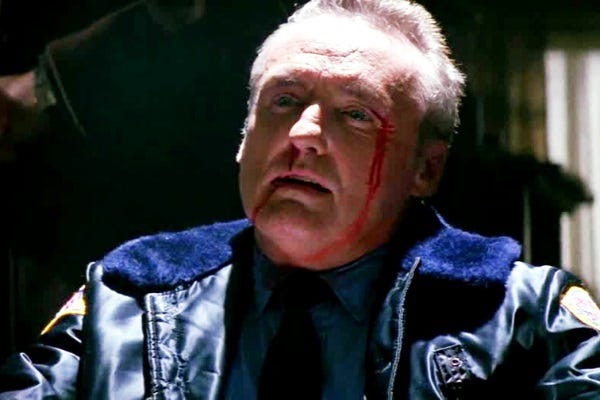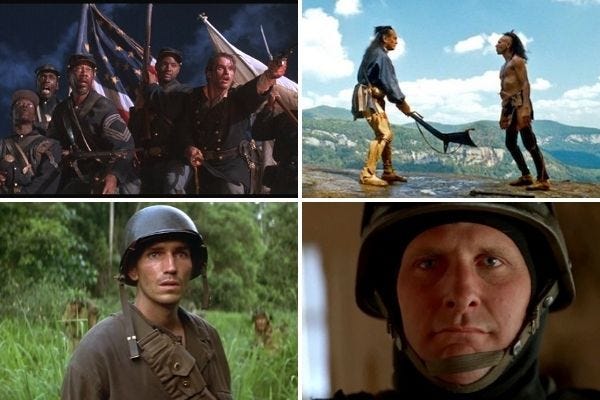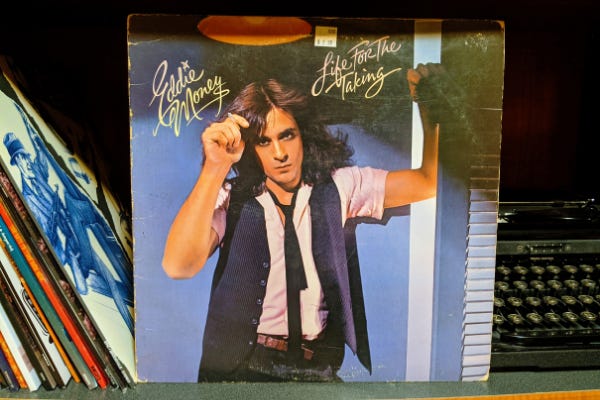Note: This post comes from John’s weekly newsletter, The Daly Grind:
There was a Twitter chain last week that challenged people to name the best “I’m dead and I know it moment” in cinema history. It was a fun little survey, and it was interesting to check out people’s choices.
As a story-teller and movie buff, I have a particular affection for this type of scene — where a character comes to terms with his or her forthcoming demise, and either succumbs to the situation or goes out with a defiant bang. If done right, such a scene can end up the most memorable and iconic moment of a film.
There were lots of great answers to the challenge, including some strong candidates I had forgotten about. Here were some honorable mentions (in images):
But the scene that immediately came to my mind, and also came to the minds of others, was from 1993’s True Romance.
True Romance would probably rank among my top-25 favorite films, if I were to ever sit down and actually try and come up with a list. To be clear, I’m not suggesting it’s one of the best 25 films ever made. To me, there’s a difference between being “the best” and being “a favorite,” because what attracts or resonates with people often goes beyond pure, objective quality.
Still, I do think it’s a high-quality film with a high-quality (even epic) cast that included some rising stars of the time (like Christian Slater, Patricia Arquette, Brad Pitt, Gary Oldman, Val Kilmer, James Gandolfini, and Tom Sizemore), along with some Hollywood big leagues (like Dennis Hopper and Christopher Walken).
The writing, however, is where the movie really shines. The stylish, well-developed (and often outlandish) characters range from endearingly interesting and comedic, to convincingly sinister. The dialogue is uncouth and mesmerizing, and none of this should be surprising considering who wrote it: a little-known talent at the time, named Quentin Tarantino.
The following year, Tarantino would direct another film he wrote — the one that ended up making him a Hollywood heavyweight: Pulp Fiction.
True Romance, however, was directed by Tony Scott, and you can see his mark all over the film. It compliments Tarantino’s writing well.
Anyway, back to the “I’m dead and I know it” moment. Anyone who’s seen the movie knows exactly which one I’m talking about. It’s the amazing cinematic confrontation between aging security guard and retired police officer Clifford Worley (played by Dennis Hopper), and ruthless mob operative Vincenzo Coccotti (played by Christopher Walken).
To set the scene, Worley has been tied up in his trailer and tortured by Coccotti and his men. The mobsters are trying to figure out the whereabouts of Worley’s estranged son, Clarence, who has a bag full of their drugs. Worley knows nothing about the drugs, but he does know where Clarence is — or at least where he’s headed. But he’s pretending otherwise to protect his son.
Coccotti is a dark, crafty, and highly perceptive individual. He knows Worley is lying, and he’s not going to leave the trailer until he has the information he came for.
As a former cop, Worley knows Coccotti’s boss by reputation. He knows his captors are serious players, and he’s determined not to give up his son… no matter what. He also understands that he’s not going to get out of the situation alive, regardless of what he says or doesn’t say.
Like Coccotti, Worley is a very perceptive man. Understanding that he’ll soon be dead, he decides to spend his last few minutes on Earth calmly and coolly getting under Coccotti’s skin in the most deeply personal terms he can formulate from what he’s learned during the interrogation. The result below is cinematic gold (warning: there’s some very rough language):
Tarantino later described the scene as one of his proudest moments of his entire career, and that it was perhaps even too strong for its relatively early placement in the film. It’s the type of thing some filmmakers might worry about, in that it could set the bar too high for the rest of the movie.
But that wasn’t a problem, as Tarantino acknowledges. The rest of the film delivered, including an explosive, very well done climax that is equally (or perhaps even more) memorable than the Hopper/Walken scene.
Those who’ve read my Sean Coleman Thrillers know I’ve produced a few “I’m dead and I know it” moments myself. They’re fairly complex to write, and they should be. A character coming to terms with the end of his or her life shouldn’t be written in a cavalier or formulaic way. We’re talking about an incredibly heavy epiphany, after all. It should mean something, both to the character and to the audience.
Readers can decide if I’ve done it effectively, but I’m quite proud of my work on these scenes, and without giving any of the story away, I’ll just say that a particular individual’s demise, that I’ve written in my upcoming book “Restitution” (which should be available for pre-order on Amazon and elsewhere any day now), is perhaps my favorite of the entire series.
I can’t wait for you all to read it.
Which “I’m dead and I know it” movie scene do you think is the best? Let me know in an email or in the comment section below.
Random Thought
Obligatory Dog Shot
Zzzzz…
Featured Vinyl
As was the case with a lot of people my age, my first exposure to Eddie Money came from his huge 1986 pop-rock hit, “Take Me Home Tonight.” It was a cool song on a good album (“Can’t Hold Back”), and I liked some of his later stuff as well.
Money co-headlined the first concert I ever went to (something I told him when I met him a few years ago). It was in the summer after my high school graduation; an outdoor festival event in a field, where he shared top-billing with REO Speedwagon and Cheap Trick.
It was a blast, only hindered by some shirtless dude in era-appropriate jean-shorts who got really mad at me for causing him to spill some of his beer.
Anyway, I think it was during that concert that I realized just how many other hits Eddie Money had — ones that proceeded what was actually more of a career revival in the late 1980s. “Two Tickets to Paradise” and “Baby Hold On” were of course two of his biggest, but “Gimme Some Water” was one that really stuck out for me the day.
It might have been the rugged, western theme, but whatever it was… I dug it. The song was recorded for the “Life for the Taking” album in 1978, which didn’t produce any significant hits. Regardless, “Gimme Some Water” sounds absolutely great on vinyl, which is why the album is this week’s “featured vinyl.”
That’s all for now. Thanks for reading today’s Daly Grind.
Want to drop me a line? You can email me at johndalybooks@hotmail.com, and also follow me on Facebook, Twitter, and Instagram. If you haven’t subscribed to this newsletter yet, please click on the “Subscribe now” button below. Doing so will get these posts emailed directly to you.
Also, if you’re not caught up on my Sean Coleman Thrillers, you can pick the entire series up at a great price on Amazon. And if you’re interested in signed, personalized copies of my books, you can order them directly from my website.
Take care. And I’ll talk to you soon!




